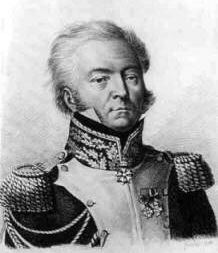General Louis Lepic

Born: September 20, 1765
Place of Birth: Montpellier, Hérault, France
Died: January 7, 1827
Place of Death: Andrésy, France
Arc de Triomphe: LEPIC on the east pillar
Pronunciation:
Louis Lepic was a career cavalry soldier, initially enlisting in a regiment of dragoons of Lescure in 1781. A decade later at the start of 1791 he joined the 2nd Chasseurs à Cheval and then in 1792 he was promoted to capitaine. In 1793 Lepic was promoted to chef d'escadrons and he began serving with the Army of the West against the Vendéens. That September he fought at Montaigu where he was wounded by a shot to the thigh. In 1796 Lepic helped Travot capture the royalist rebel Charette. Next he was transferred to the Army of Italy where he would remain for a number of years. In 1799 Lepic fought fiercely at Pastrengo where he was wounded by seven saber blows to the head and one to the shoulder, and a shot to the arm. For his conduct there, he was promoted to chef de brigade of the 15th Chasseurs à Cheval on the battlefield. The next year Lepic took part in the Battle of Marengo.
Lepic spent the next few years serving in garrisons in Italy. When the campaigns against the Third Coalition began in 1805, Lepic was employed in the advance guard of the Army of Italy. After the campaign was completed, on December 18th Lepic was given the position of colonel-major of the Grenadiers à Cheval of the Imperial Guard and so he began serving with the main body of the Grande Armée. He served in Prussia and Poland from 1806 to 1807.
Lepic often suffered from arthritis and he regularly received treatment from Dr. Larrey. In February of 1807, on the morning of the Battle of Eylau, Larrey assisted Lepic so he could fight in the battle. Waiting for their moment to shine in the battle, Lepic's cavalry was bombarded by artillery and he shouted out to his men, "Heads up, by God! Those are bullets, not turds!"1 As the French left reeled backwards from a Russian attack and Larrey's hospital came into danger, Lepic led his cavalry to the rescue and drove the Russians back.2
Later in the battle, as VII Corps was being destroyed by the Russians, Napoleon ordered a great cavalry charge to try and alleviate the situation. Lepic and his men were part of this great charge, but they penetrated too deeply and were unable to return to the French lines. A Russian officer asked them to surrender, and Lepic pointed his saber at his men and replied, "Look at those mugs there. Tell me honestly, sir, do they look as though they want to surrender?"3 Lepic and his men then cut their way back through the Russian line. Napoleon happily greeted Lepic as he returned to the French line and Napoleon told Lepic that he had feared he would soon be receiving a report of Lepic's capture since it had taken so long for Lepic to return. Lepic responded, "The only report you shall ever receive will be of my death, not of my capture."4 Nonetheless, Lepic had not escaped unscathed, having received wounds to his legs and knees. Less than a week later he was promoted to général de brigade.
In 1808 General Lepic went to Spain with his unit of the Guard. The next year he returned to France and then he took part in the campaign against Austria that year. During the campaign he was rewarded as a Baron of the Empire and Commander of the Legion of Honor and then he served at Wagram . In 1810 he went back to Spain and in 1811 he briefly served in the Army of Portugal before returning to France.
In 1812 Lepic took part in the campaign against Russia and during the retreat on November 7th he and his men sent Platov's cossacks reeling. In 1813 he was promoted to général de division and he became colonel of the 2nd Guards of Honor. Lepic served during the campaign in Saxony that year and then at the end of the year took command of the 21st military division. After Napoleon abdicated in April of 1814 Lepic was put on non-activity by the Bourbons. With Napoleon's return in 1815 for the Hundred Days Lepic served in the headquarters of the Army of the North and after Napoleon's second abdication he retired.
Notes
- Philip J. Haythornthwaite, Who Was Who in the Napoleonic Wars, (London: Arms & Armour, 1998), 190.
- Robert Richardson, Larrey: Surgeon to Napoleon's Imperial Guard, (London: Quiller Press, 2000), 114.
- F. G. Hourtoulle, From Eylau To Friedland, trans. Alan McKay, (Paris: Histoire & Collections, 2007), 58-60.
- Edward Ryan, Napoleon's Shield and Guardian: The Unconquerable General Daumesnil, (London: Greenhill Books, 2003), 150.
Bibliography
- Haythornthwaite, Philip J. Who Was Who in the Napoleonic Wars. London: Arms & Armour, 1998.
- Six, Georges. Dictionnaire Biographique des Généraux & Amiraux Français de la Révolution et de l'Empire (1792-1814). 2 vols. Paris: Gaston Saffroy, 2003.
External Links:
Updated March 2023
© Nathan D. Jensen